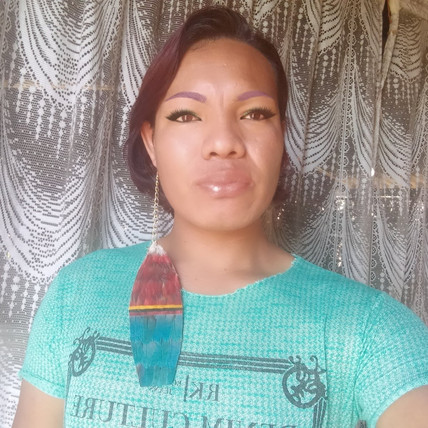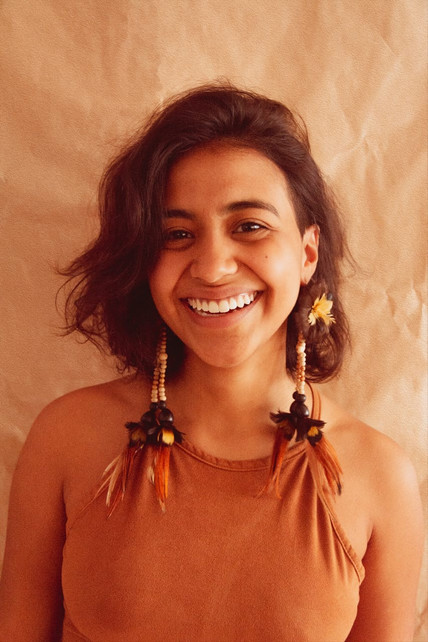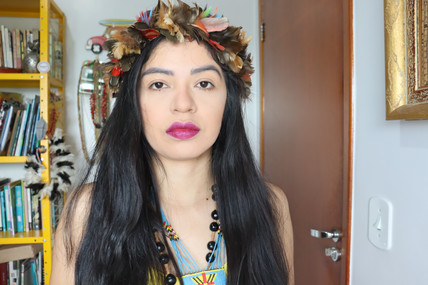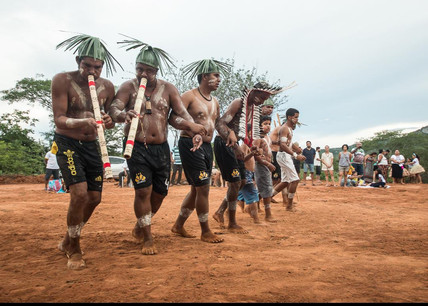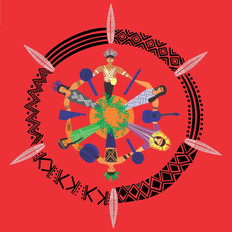
Indígenas.br - Indigenous Music Festival 2022 - 27/08
The last day of Indígenas.br will be marked by Casa das Mulheres and performances by indigenous artists from the contemporary music scene.
10:00 to 12:00 - Body painting workshop with Xikrin (PA)
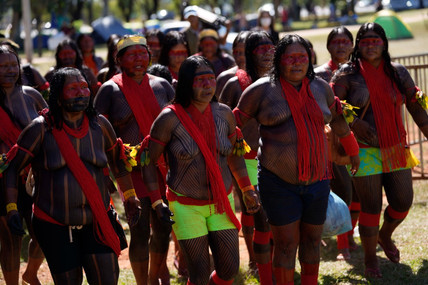 Among the Xikrin, body painting is a special language: performed only by women, Xikrin graphic art dresses the individual so that it presents itself appropriately in the community. It is an essential activity in the daily lives of this people, with geometric graphics, which represent initiation, nomination, marriage, birth, protection and mourning. Xikrin girls, from an early age, train the art of body painting on their legs, on fruits, dolls, and paper.
Among the Xikrin, body painting is a special language: performed only by women, Xikrin graphic art dresses the individual so that it presents itself appropriately in the community. It is an essential activity in the daily lives of this people, with geometric graphics, which represent initiation, nomination, marriage, birth, protection and mourning. Xikrin girls, from an early age, train the art of body painting on their legs, on fruits, dolls, and paper.
14:00 - Women's House
A conversation with women in fashion, literature, the arts, music, youth, resistance movements, and environmental issues.
Chief Majur Traitowu
Majur Traitowu is the first trans chief of the Boe-Bororo people and belongs to one of the Baadojeba and Iwagudu clans. Her father was an important elder among her people, and tasked her with continuing leadership in the village of Apido Paru. Majur travels between the non-indigenous world and the village and has supported several audiovisual and research projects, in addition to currently promoting the cosmetics brand Cris Dios Organics, from the Lace and Hair salon.
Graciela Guarani
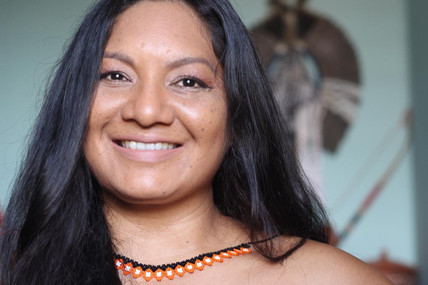 A
A
cultural producer, director, screenwriter and curator, Graciela belongs to the Guarani and Kaiowá people (Mato Grosso do Sul). In his curriculum, he directs, screenplays and photographs for more than 8 audiovisual works, including directing and photography in the internationally awarded feature documentary “My Blood is Red” by the English producer Needs Must Film. She was the author of the Globo network special “Falas da Terra”. She is currently the director of the second season of the Netflix series “Invisible City”. She is one of the pioneering and most active indigenous filmmakers in audiovisual productions in the Brazilian cinema scene.
Roseli Concianza Jorge
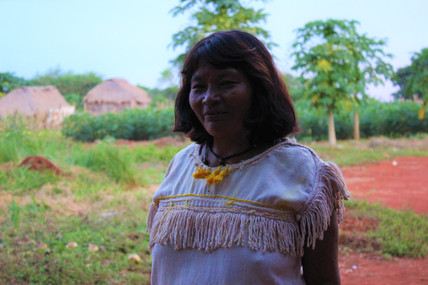
Roseli Concianza Jorge is the spiritual leader of the Kaiowá people, the great-granddaughter of Pa’i Chiquito, founder of the Panambizinho community in Mato Grosso do Sul. Roseli is currently the person most engaged in promoting ritual chants in the Panambizinho Indigenous Territory. She is one of the main connoisseurs of ñevanga, a therapeutic ritual based entirely on words. “This ritual was much more valuable, and now few trust it”, complains our interlocutor, explaining that doctors, nurses, and health workers have pushed traditional therapies into limbo. Roseli and her husband are known for their engagement in the fields of social and ritual life. Even though she is prevented from leading the long Corn Festival prayer because she is a woman, she is a prayer scholar and is preparing to direct it.
Djotana AKA Siba Carvalho
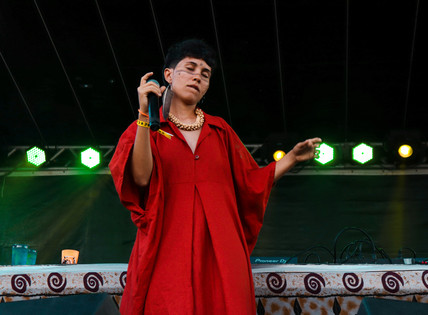
The multi-artist and art educator Djotana aka Siba Carvalho, from the Puri Teyxokawa people, is a member of the movement and the ancient philosophical line of women “Wayrakunas” and of the art educator collective Puri “Txemim Puri”. Siba seeks to combine ancient music with indigenous futurism, reflecting on the indigenous presence in villages and cities, highlighting the preservation of traditional knowledge and Mother Earth. The project is inspired by his grandmother, who used to create songs related to the enchanted force in Lands of Puri, in the interior of Rio de Janeiro. His work crosses the paths of spirituality and indigenous struggle and mixes elements of reggae, hip-hop, and rhythms from Pernambuco combined with the psychedelic synths of the DJ and producer Synesthezk with whom he has partnered.
Siana Leão Guajajara
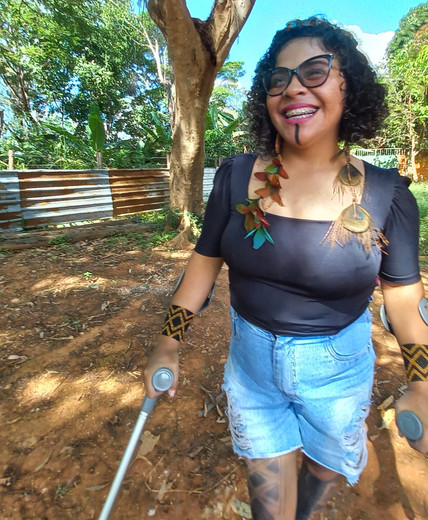
Siana Leão Guajajara is from Aldeia José Paraíba, located in the Reserva Cana Brava/ Guajajara Indigenous Territory, located in the center of Maranhão.
He currently lives in Taguatinga Sul (DF) and has a degree in Literature – Portuguese from the Federal Institute of Brasília (IFB). This institution develops a project aimed at inclusive education. She also works on a personal project with other indigenous people with disabilities under the title of #Acessibilindígena: My disability does not make me less indigenous, which aims to give visibility to indigenous people with disabilities, so that they have their own voice, because disability does not limit access.
Nayara Guajajara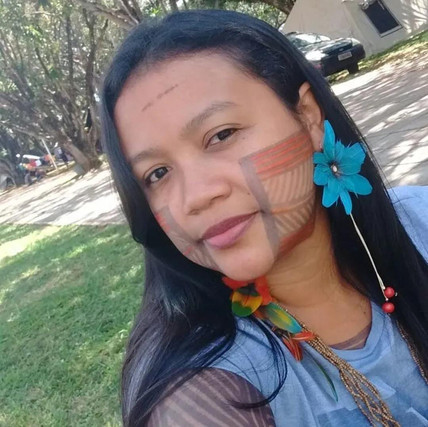
Educator Nayara Guajajara.
Day Molina
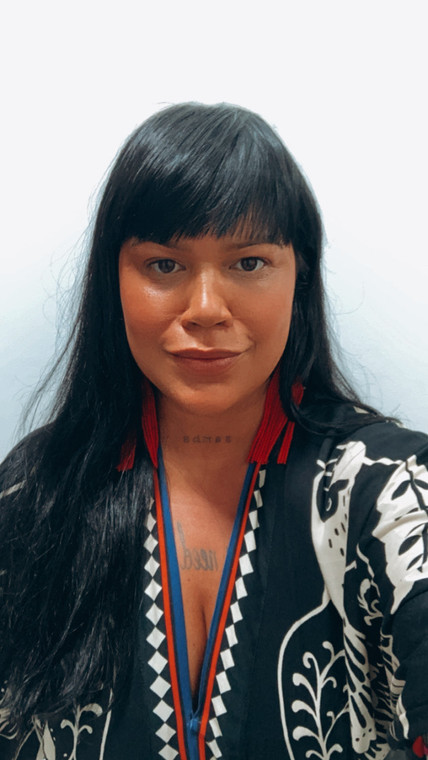
Dayana Molina is an indigenous stylist and artist descended from the Aymara and Fulni-ô peoples. Founder of the indigenous collective Moda BR and of the #descolonizeamoda movement.
Contemporary thinker who writes, debates, and researches sustainable and decolonial fashion. It has been operating in the Latin American fashion market for 14 years and founded its own brand, NALIMO, 5 years ago. She is currently a contributing columnist for the fashion magazine Bazaar BR and an activist for the global movement for sustainability in fashion (Fashion Revolution).
Isabela Santana
Isabela Santana is an actress and multi-artist Pataxó. The root-memory of your family is the starting point and guide for your creative projects and processes. Within the artistic universe, she also works as a producer and communicator. She is the co-founder of Indigenous Visibility (VI), a digital media outlet that seeks to promote the plural voices of indigenous peoples through culture, contemporary art, cinema, literature, education, and cultural events around Abya Yala and the world. He represented VI during Imagine NATIVE 2019, considered the largest indigenous film and digital media festival. She is currently the administrator of the Emerging Filmmakers Program at the international organization If Not Us Then Who? , a project to strengthen filmmakers from the Global South, and also a member of Utero Amotara Zabelê.
Mediation by Julie Dorrico
Julie Dorrico belongs to the Macuxi people. PhD in Literary Theory at PUCRS. Master in Literary Studies and a degree in Portuguese Literature from UNIR. She is a poet, writer, speaker, researcher of indigenous literature. He won first place in the TamoiOS/FNLIJ/UKA competition for New Indigenous Writers in 2019. Administrator of the @leiamulheresindigenas Instagram profile and of the YouTube channel Contemporary Indigenous Literature. Curator of the 1st Indigenous Literature Exhibition at the Indian Museum (UFU). Author of the work “I am Macuxi and other stories” (Caos e Letras, 2019).
16:00 to 21:00 - Presentations
Xikrin (PA)
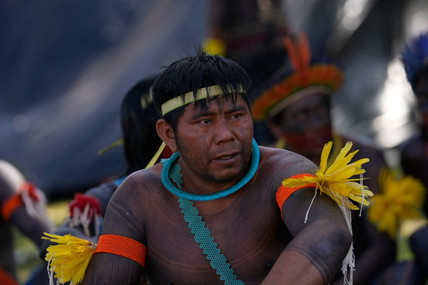 Xikrin musicality is predominantly vocal and bodily. The feet and hands of people who dance, sometimes beating hard, sometimes lighter, set the rhythm and rhythm of singing and dancing, sometimes accompanied by screams and onomatopoeia. Xikrin musicality is expressed through the rituals that are part of the initiation cycle, the nomination cycle or even the marriage on the treadmill, the return of a collective hunt, war expeditions or ritual crying. There are few musical instruments used by the Xikrin, the most important being the maracá.
Xikrin musicality is predominantly vocal and bodily. The feet and hands of people who dance, sometimes beating hard, sometimes lighter, set the rhythm and rhythm of singing and dancing, sometimes accompanied by screams and onomatopoeia. Xikrin musicality is expressed through the rituals that are part of the initiation cycle, the nomination cycle or even the marriage on the treadmill, the return of a collective hunt, war expeditions or ritual crying. There are few musical instruments used by the Xikrin, the most important being the maracá.
Pankararu Cultural Nation (PE)
The Pankararu Cultural Nation group is made up of young people from the community of this people of Pernambuco who, through orality and memories, reconnected with the Buzzo dance ritual, a wind instrument made of hollow wood, a bass and a treble, used during a ritual with the players. This ancestral and traditional practice of the Pankararu people is carried out collectively, in rites of celebration, festivities involving music and dance.
They have participated in festivities inside and outside the community, and held artistic and cultural performances at Sesc Petrolina, Sesc Santo Amaro, at a concert by Gean Ramos Pankararu and in several states of the country, including Bahia, São Paulo and Brasilia.
Djotana AKA Siba Carvalho (Puri) “+ synesthezk”
 The multi-artist and art educator Djotana aka Siba Carvalho, from the Puri Teyxokawa people, is a member of the movement and the line philosophical ancestor of women “Wayrakunas” and the art collective educators Puri “Txemim Puri”. Siba seeks to unite ancestral music with indigenous futurism, bringing reflection on the indigenous presence in villages and cities, highlighting the preservation of traditional knowledge and Mother Earth. The project is inspired by his grandmother, who used to create songs related to the enchanted force in Puri lands, in the interior of Rio de Janeiro. Her work crosses the paths of spirituality and indigenous struggle and mixes elements of reggae, hip-hop and Pernambuco rhythms combined with the psychedelic synths of DJ and producer Synesthezk with whom she has partnered.
The multi-artist and art educator Djotana aka Siba Carvalho, from the Puri Teyxokawa people, is a member of the movement and the line philosophical ancestor of women “Wayrakunas” and the art collective educators Puri “Txemim Puri”. Siba seeks to unite ancestral music with indigenous futurism, bringing reflection on the indigenous presence in villages and cities, highlighting the preservation of traditional knowledge and Mother Earth. The project is inspired by his grandmother, who used to create songs related to the enchanted force in Puri lands, in the interior of Rio de Janeiro. Her work crosses the paths of spirituality and indigenous struggle and mixes elements of reggae, hip-hop and Pernambuco rhythms combined with the psychedelic synths of DJ and producer Synesthezk with whom she has partnered.
Nelson D.
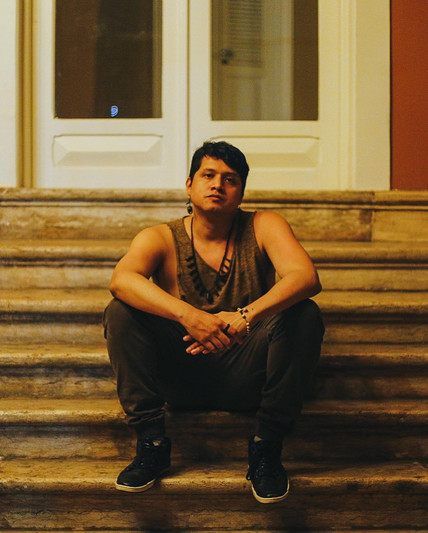
An
